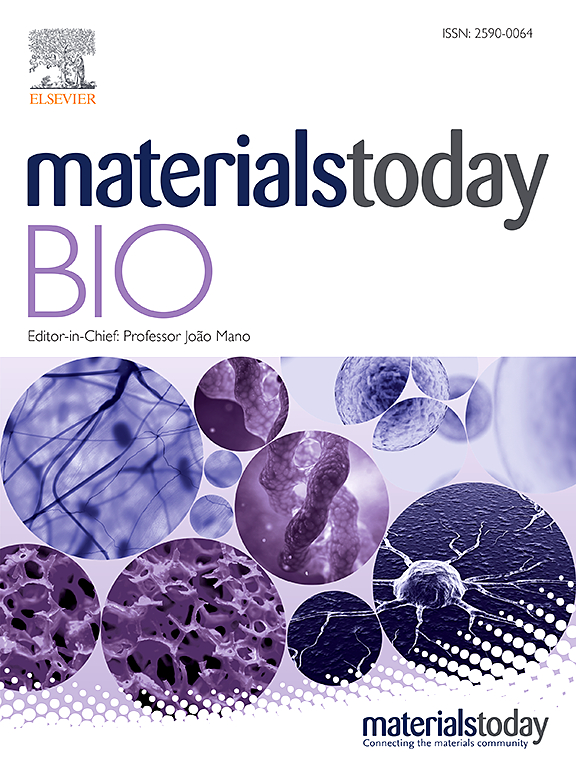液滴中的器官组织用单细胞制作均匀的胰腺癌器官组织
IF 8.7
1区 医学
Q1 ENGINEERING, BIOMEDICAL
引用次数: 0
摘要
癌症类器官提高了我们对患者肿瘤的组织学、基因型和药物反应的概括理解,以进行个性化医疗。然而,现有的癌症类器官通常是在动物源性基质(如Matrigel)中生长的,由于种子细胞来源不可控、基质不确定以及人工操作,这些基质的可重复性和通量较低。在这里,我们报告了一种新的策略,在单个细胞的液滴系统中大量产生均匀的胰腺癌类器官(PCOs)。该系统由全水液体组成,可以将单个肿瘤细胞温和地包裹成孤立的液滴,这些液滴随后增殖并自组装成类器官,类似于体内肿瘤的初始状态。这种高通量方法可以在一个批次中生产数千个类器官。液滴可以作为模板,合成具有与天然肿瘤相似刚度的微凝胶,促进PCOs的功能表达。与人工滴入基质中培养的类器官相比,这些类器官在大小和形态上表现出优越的均匀性和可控性,这主要是由于初始细胞的数量和微凝胶的数量是可控的。此外,经RNA-seq和PCR分析证实,所建立的类器官保持了胰腺肿瘤的关键生物标志物(如KRT7、KRT19和SOX9)和较高的药物代谢相关基因表达。此外,在自动移液工作站中,它们对四种临床使用的药物表现出不同的反应,表明该方法在高通量药物检测中是可行的。所建立的策略将单个细胞的PCOs形成、3D培养和分析整合在一个完整的系统中,这可能为推进类器官研究提供一个新的平台,并在转化应用中采用标准化的程序。本文章由计算机程序翻译,如有差异,请以英文原文为准。

Organoid in droplet: Production of uniform pancreatic cancer organoids from single cells
Cancer organoids have improved our understanding of recapitulating the histology, genotypes, and drug response of patient tumors for personalized medicine. However, the existing cancer organoids are typically grown in animal-derived matrices (e.g., Matrigel), which suffer from poor reproducibility and low throughput due to uncontrollable origin of seed cells, undefined matrix, and manual manipulation. Here, we report a new strategy to massively generate uniform pancreatic cancer organoids (PCOs) in a droplet system from single cells. This system is composed of all-in-water fluids that allow to mildly encapsulate single tumor cell into isolated droplet, which subsequently proliferate and self-assemble into organoids, resembling the initial state of a tumor in the body. This high-throughput method can produce thousands of organoids in a single batch. The droplets can serve as templates for synthesizing defined microgels with proper stiffness similar to that of native tumors, facilitating functional expressions of PCOs. These organoids exhibit superior uniformity and controllability in terms of size and morphologies compared with organoids cultured in manually dropped Matrigel, due mainly to the controllable number of initiating cells and defined microgels. In addition, the established organoids maintain the key biomarkers of pancreatic tumor (e.g., KRT7, KRT19 and SOX9) and higher expression of genes associated with drug metabolism confirmed by RNA-seq and PCR analysis. Furthermore, they show distinguishing responses to four clinically used drugs in a reproducible manner in automatic pipetting workstation, indicating the feasibility of the proposed method in high-throughput drug testing. The established strategy has integrated the formation, 3D cultures, and analysis of PCOs derived from single cells in a whole system, which may provide a novel platform for advancing organoids research with standardized procedure in translational applications.
求助全文
通过发布文献求助,成功后即可免费获取论文全文。
去求助
来源期刊

Materials Today Bio
Multiple-
CiteScore
8.30
自引率
4.90%
发文量
303
审稿时长
30 days
期刊介绍:
Materials Today Bio is a multidisciplinary journal that specializes in the intersection between biology and materials science, chemistry, physics, engineering, and medicine. It covers various aspects such as the design and assembly of new structures, their interaction with biological systems, functionalization, bioimaging, therapies, and diagnostics in healthcare. The journal aims to showcase the most significant advancements and discoveries in this field. As part of the Materials Today family, Materials Today Bio provides rigorous peer review, quick decision-making, and high visibility for authors. It is indexed in Scopus, PubMed Central, Emerging Sources, Citation Index (ESCI), and Directory of Open Access Journals (DOAJ).
 求助内容:
求助内容: 应助结果提醒方式:
应助结果提醒方式:


